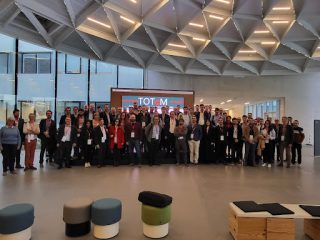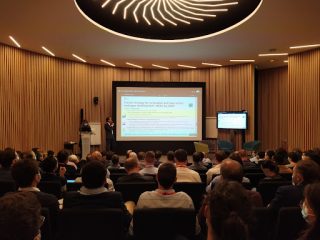-
Summary and key learnings from the 48th TOTeM on ‘Hydrogen for Decarbonisation’
Date posted:
-
-
-
Post Author
Greg Kelsall
-

The 48th IFRF Topic Orientated Technical Meeting (TOTeM) on ‘hydrogen for decarbonisation’ was scheduled for 13th of October at the Air Liquide R&D centre near Paris, as reported in a recent news article. Now that the event has concluded, I asked Sébastien Caillat and David Honoré to give a brief summary of the event and the key learnings.
As we had hoped, the TOTeM, an official side event of the European Hydrogen Week 2022, proved to be a great success with a programme for the day including 3 keynote lectures, 8 oral presentations, 15 posters and a round table with 4 experts. The event kicked-off with the three keynote lectures covering an overview of the hydrogen strategy for a climate neutral Europe, an in depth presentation on the subtleties and complexities of hydrogen combustion, together with a presentation on the challenges and opportunities of hydrogen for industrial process heating. The day concluded with a round table on the safety approach of new fuels from production to end usage. All presentations and posters are available to the participants on the IFRF web site.
A record number of 110 participants from 13 countries attended, with 45% of participants from academia representing 19 universities. Industrial participants attending were from 32 companies covering a range of different sectors, from production and transport, to end usage in combustion systems, such as domestic appliances, gas turbines, oil and gas, glass and steel industries. In terms of the gender balance of participants, this was still not equilibrated. Female participants represented 20.9 % of the total, a number remarkably close to the percentage of oxygen in air… The reader is free to make any interpretation he or she may find useful !
Many discussions took place during the Q&A and the round table, but also during the extended poster and lunch breaks. Some of the learnings from the TOTeM are given below:
- Hydrogen is a good candidate as an alternative renewable decarbonated fuel. There are opportunities for research, demonstrations and applications of hydrogen combustion in industry, regarding international, European and national strategies for the development of decarbonated hydrogen.
- The specificities of hydrogen combustion have been addressed during the meeting: global properties (density, calorific value, adiabatic temperature, laminar burning velocity…), flame instabilities in premixed conditions, soot formation when using fuels blended with hydrogen, change of heat transfer properties, the routes of NO formation and the subsequent levels of NOx emissions.
- Several approaches for hydrogen combustion studies have been presented during the TOTeM. CFD simulations are performed with DNS, RANS, LES, reactor based models, digital twin, and using adapted chemical reactions schemes to simulate many situations from academic configurations to industrial-size furnaces.
- In the same manner, experiments are done at lab-scale with different burners configurations, in semi-industrial facilities and as demonstrations in industrial plants. The issue of hydrogen availability for large-scale experiments is pointed out, as well as the difficulty of emissions measurements in flue gas containing large amounts of water vapour. The colour and visibility of hydrogen flames were also discussed.
- Some demonstrations of applications of hydrogen combustion already exist in industry: glass, steel, aluminium, industrial boilers, gas turbines… Hydrogen is also used in specific combustion regimes, as oxy-combustion or mild flameless combustion. A precise definition of the latter is still a subject of discussion. Addition of hydrogen can be used to help ammonia combustion, another decarbonated fuel.
- Guaranteed availability of hydrogen can be an issue to secure an industrial process. The quality of hydrogen can also have an impact on the quality of the product.
- Last but not least, the safety of hydrogen is of primary importance for its application in industry.
To conclude, IFRF would like to thank Air Liquide for hosting the meeting, the scientific and organising committees for the preparation, the sponsors Alliance Allice, GRTGaz, Siemens and ThermoFisher for their support and the large audience for participating in this TOTeM.
To see photos of the event and to access the presentations, follow this link.

